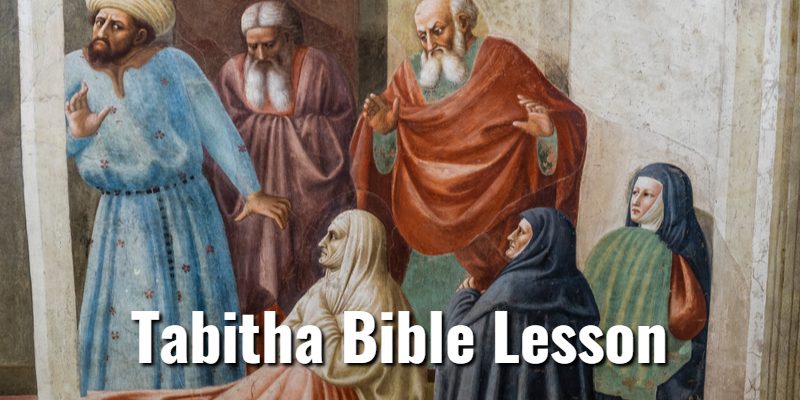Lord’s Library contributor Lonetta Key wrote this concise Scripture-based resource that highlights Tabitha’s Bible lesson with meaning and commentary. Check out Lonetta’s blog: Living Before God’s Face. Lord’s Library’s Ministry Leaders Series is a collection of contributed articles written by ministry leaders on key Christian topics.
 Acts 9:36: “Now there was at Joppa a certain disciple named Tabitha, which by interpretation is called Dorcas: this woman was full of good works and almsdeeds which she did.”
Acts 9:36: “Now there was at Joppa a certain disciple named Tabitha, which by interpretation is called Dorcas: this woman was full of good works and almsdeeds which she did.”
I wish I could have known this lovely lady. I wonder if she would have preferred me to call her Tabitha or Dorcas. I know I would have truly enjoyed having coffee and pastry with her. I can envision her engaging smile and feel her heartwarming hug.
Her story covers only a few verses (Acts 9:36-41). But her contribution as a Christian lady to the work of the Lord figured prominently enough in the scope of things that she is spoken of by name: “Now there was at Joppa a certain disciple named Tabitha, which by interpretation is called Dorcas: this woman was full of good works and almsdeeds which she did. And it came to pass in those days, that she was sick, and died: whom when they had washed, they laid her in an upper chamber. And forasmuch as Lydda was nigh to Joppa, and the disciples had heard that Peter was there, they sent unto him two men, desiring him that he would not delay to come to them. Then Peter arose and went with them. When he was come, they brought him into the upper chamber: and all the widows stood by him weeping, and shewing the coats and garments which Dorcas made, while she was with them. But Peter put them all forth, and kneeled down, and prayed; and turning him to the body said, Tabitha, arise. And she opened her eyes: and when she saw Peter, she sat up. And he gave her his hand, and lifted her up, and when he had called the saints and widows, presented her alive.”
Tabitha Bible Lesson
Now Luke leaves the description of the totality of those acts unspecified. But we do learn that undershirts or tunics and other garments were included in her gifts. (verse 39) So it would appear that one of her talents was being a seamstress: “Then Peter arose and went with them. When he was come, they brought him into the upper chamber: and all the widows stood by him weeping, and shewing the coats and garments which Dorcas made, while she was with them.”
Let us examine the above verse. First, it says Tabitha’s offerings were abounding. This would indicate she gave liberally and not grudgingly—she was prolific in her philanthropy.
Then let us consider the deeds. The dictionary definition is an action that is performed intentionally or consciously. In other words time, planning, energy, labor, and physical interaction with others were required.
Now we come to Luke’s characterization of those deeds as kindness and charity. I read several descriptions of charity: unselfish love of one’s fellow men; voluntary giving of help to those in need; generosity and helpfulness. And kindness denotes being friendly, generous, and considerate. She is truly a woman of great worth and a hero in her community.
Then Scripture goes on to tell us Tabitha did these things continually. She did not relegate these matters to whenever she had a few extra minutes. They were her life—she constantly gave of herself to others.
However, as this story continues it takes an unexpected turn. In Verse 37 we read of her death which was greatly mourned by all who knew her as well as those who had been her beneficiaries: “And it came to pass in those days, that she was sick, and died: whom when they had washed, they laid her in an upper chamber.”
Now this next part is exciting. Luke does not bother to fill in details but apparently, the disciples in Joppa where Tabitha lived felt her ministry was very essential.
So, with an accompanying urgent message, they sent for the Apostle Peter who happened to be in a nearby town. We find in verse 40 that the purpose of this interruption in his life was to raise Tabitha from the dead: “But Peter put them all forth, and kneeled down, and prayed; and turning him to the body said, Tabitha, arise. And she opened her eyes: and when she saw Peter, she sat up.”
The narrative continues describing how Peter knelt down and prayed beside the body. He then said, “Tabitha, arise.” And she did! Her mission was not yet completed. God needed her to continue to serve.
There is so much to be derived from this woman’s example. Does Tabitha-like kindness and charity delineate our lives? Do we abound in deeds that put the needs of others in a prominent position in our schedules? Do we utilize our God-given assets and talents for His glory as we are attentive to the necessities of the less fortunate?
I am wondering if there are times when we assume we have completed a task the Lord has set for us—that we have striven and toiled with all our energy. And we come to the conclusion that we have given all we can. But then we feel Jesus taking us by the hand and hear Him saying, “arise.”
Lord's Library participates in affiliate programs. We may make a small commission from products purchased through this resource.
- Philippians 2:5 Meaning: Commentary on the Mind of Christ - January 14, 2025
- Mind of Christ in the Bible: Meaning, Scripture & Commentary - January 11, 2025
- Matthew 2:13-14 Meaning: A Joint Effort - September 10, 2024












